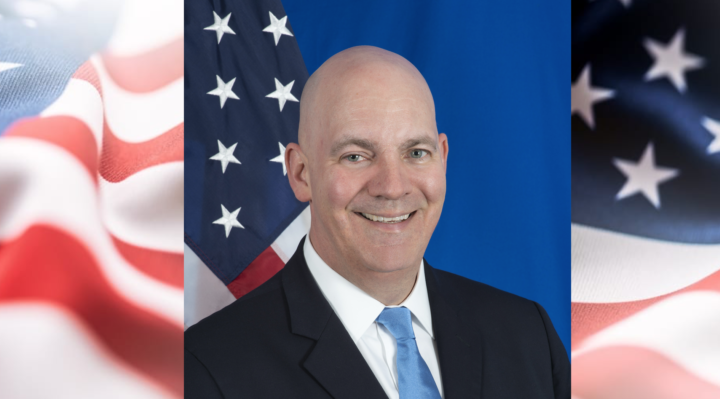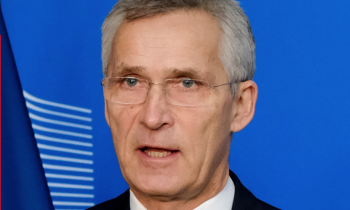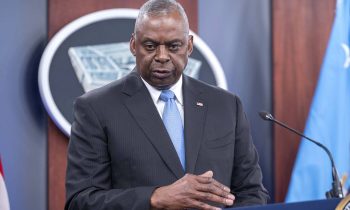The United States said imposing economic sanctions on Turkey for its purchase of Russian S-400 missiles remained a very viable option and there was no discord on the issue.
“Seeking resolution is still within the realm of possible today, but imposition of sanctions remains a course of action and a very viable one at this point,” U.S. Assistant Secretary of State for Political-Military Affairs Clarke Cooper told reporters on a teleconference.

Below is a full rush transcript of the press conference by Assistant Secretary Clarke Cooper, Bureau of Political-Military Affairs.
A/S Cooper: I just want to share at the top of our discourse today what it is that I do, why I’m actually in Europe. As Assistant Secretary of Political-Military Affairs I have the portfolio, the global portfolio of security assistance and foreign military sales. So from a very general sense what that means is we actually are the primary lead for the United States government on acquisition and sustainment when it comes to military equipment, military sales for our partners, to enable their own sovereignty as well as play their regional roles in their security. We’ll talk a little bit more about that today in the context of Europe.
The other aspect of that is security assistance. This is not just in the form of hardware or in munitions. This also comes in the role of training, of joint exercises. This also comes in the role of supporting peacekeeping operations that have either been identified or mandated by any multilateral body, particularly the United Nations. We do provide a role for that in our Global Peace Operations Initiative.
Finally, one that’s maybe not known to some of you is the work that we do on destruction of conventional weapons. Conventional weapons destruction, remediation of minefields, actually providing reconciliation for societies that have sustained conflict and are looking to get past conflict and back to day-to-day lives.
So it’s a very deep, very broad portfolio. Again, including some what people would see as the large, expensive, big ticket items for Ministry of Defense to the operational level of security assistance, either from a bilateral level or again on peacekeeping operations. Then finally, again, playing a significant role on the humanitarian side of actually assisting communities in a post-conflict environment and then getting them back to a stable state.
With that, why I’m in Europe was to participate in the Paris Air Show there. That’s an opportunity for any of us who are working in the national security framework, and Europe certainly has an opportunity for growth. We are a tremendous advocate of where Europe is going as far as their own burden-sharing, but providing a more robust posture for their own sovereign security and also a regional role for Europe. In particular, we are huge supporters of the joint declarations that were initiated in 2016 and 2018 between the European Union and NATO and we are acutely aware that even the non-NATO member states have a role when it comes to that collective defense.
In addition to having bilaterals in and out of Paris, I did take time to go to London. I did an event focused on mine remediation and addressing destruction of conventional weapons. I did that with a number of parties that we work with including an NGO. Shared the stage with His Royal Highness, the Duke of Sussex, Prince Harry. Came back to Paris for more bilats and now am here in Brussels actually doing engagements and meetings with our partners at the European Union as well as at NATO headquarters.
Question: Regarding statements of Vladimir Putin said that he really wants to talk about a strategic nuclear weapon and the situation with the sanctions. What do you think has happened?
A/S Cooper: Part of that conversation from the United States side is to actually keep Russia focused on where their commitments have been. What I don’t doubt won’t be raised is there certainly will be a conversation, a very pointed one probably, about where Russia has failed to meet their commitments on the INF Treaty. I think there’s also room for opportunity to actually identify where Russia has violated their commitments on the INF Treaty. So from a strategic standpoint, that’s a continuing conversation. It is one that probably needs to not only occur at the operational level, the diplomatic level, the ministerial level, certainly all the way up to the head of government. It is something that is still of note and requires the attention.
Question: You’ve expressed concern about the PESCO treaties and the U.S. firms being shut out. Are you making any progress in your discussions there with the EU officials?
A/S Cooper: I appreciate that. I’ll start with the EU one since we’re sitting here in Brussels, but I’ll go to the Kingdom of Saudi Arabia one next.
Discussions today and tomorrow have been focused on what we could do collectively to answer some of the concerns that have been developing not just on the U.S. side, and this is part of the conversation with the EU. Also EU member states.
So on a principal level I’ll start out with we, the United States, are very supportive of the concept of a stronger Europe, a Europe that is able to bolster the sovereignty of the individual member stats as well as that collective defense. We are certainly very much strong advocates for states being able to meet requirements that may be shared. What I mean by that is, there’s only 22, I shouldn’t say only, but the fact that there is 22 of all the entire EU that are in NATO, there are that many more states out there that are not members of NATO but yet will have what we call shared responsibility, we call it burden-sharing in other quarters, that require them to be interoperable with NATO. So some of the concerns that have been identified at a more technical level or an operational level are associated with interoperability amongst the different partners to ensure that there’s not any issues that may occur in delivery of defense.
What we have done on a more granular level is sat down with EU technocrats and member states to identify where there may be issues that arise with EDF or PESCO. I think in some cases there’s a certain level of edification that is required not only within member state governments, but also industry. I’m saying industry I’m not being parochial and limiting it to the United States. We’re talking about industry overall.
That has been received positively. I do think the timing is of the essence for us to have a more detailed conversation. Not to be date specific, but I can say it’s going to be sooner than later, and that’s going to provide an opportunity for issues that have either been identified by the United States, by EU member states, or by industry to address where we don’t want to, we don’t want to have an issue where capabilities are reduced. We don’t want to have an issue arise where interoperability is a problem. So again, I would look at it from what we’re seeking to work with the European Union on and NATO on, is to ensure that these defense initiatives that you mentioned, that they are complementary and that they’re not duplicative. And in worst case, they’re not a detraction or a deterrence. We don’t want that to happen.
So on a principle, we certainly appreciate the trajectory that the EU and NATO are wanting to bolster their status and bolster their posture, but we want it done in a way that is not going to detract from capabilities and interoperability.
I am not going to speak to their own internal ministerial considerations, but I would say that like the U.S., the UK has had longstanding bilateral security relationships. I know that there are certainly difficult situations with this partner that none of us can deny, but nonetheless, they are a long-term security partner for the UK but they’re also a much deeply rooted security partner for the United States. When we’re looking, at least from an American perspective, they are carrying a significant amount of equity to protect U.S. interests and U.S. persons, and it’s incumbent upon us to stand shoulder to shoulder with our partners, especially when they are on the front line for our interests.
But as far as where the UK has decided at this time, I would not want to opine on their internal deliberations.
Question: The Draft Bill No. 3047 which was introduced in the U.S. House of Representatives in May 2019 envisages designating Ukraine as a major non-NATO ally for the period until Ukraine joins the alliance in the future. What is the current stage of considering this draft? And what stages could it possibly bring for the U.S.-Ukraine military cooperation?
A/S Cooper: I think it should come as no surprise to you and to your readers and your news audience that there’s been a growing relationship between Ukraine and the United States. And that commitment is just getting deeper and more fulsome. I think that the legislation like this, and it’s not dissimilar to other legislation that’s been introduced, be it in the form of a resolution or an actual authorization, is an affirmation of where American interests are with the Ukraine.
So it is fair to say that there’s a growing bipartisan or it’s safe to say nonpartisan support for our partners of Ukraine. That we’ve seen not only in a political sense, but as you noted, from a defense security sense.
There’s certainly an appetite for where we can partner better, not only just on the equipment part. As I mentioned earlier, one of my portfolios is training as well as joint exercises. It is fair to say that there’s a healthy appetite in the U.S. government, particularly in our Congress, to stand close with our partner, with Ukraine, and I do see that as a growing relationship.
So this draft legislation is just one example of an expression of where we went to be close with Ukraine.
Question: The Senate is voting today to block the President from using his emergency authority to complete arms sales to Saudi Arabia and the UAE. It’s likely to pass, but I’m sure you know that it’s unlikely to clear the threshold needed to override a veto. What you think of this action in Congress and the statement that supporters of this bill are making, and also on the policy that they are seeking to put into effect ?
A/S Cooper: I would start, and I apologize if this is going over old news, but the authority that’s being cited here that the Secretary of State has to declare an emergency as far as getting military sales or direct commercial sales addressed for partner, and in this case Gulf State partners, was an authority granted by Congress 40 years ago. That is in the Arms Export Control Act, and that part of the statute was authorized by Congress. So this is not the first time. It’s also not the first time that Congress has been concerned about its application. Over the course of the history of this statute or this authority it has been very judiciously applied starting in 1979 with President Carter to to date with the Trump administration.
I say that because it’s a diplomatic tool, and in those cases it was applied as a diplomatic tool to deter further violence. For Secretary Pompeo specifically, application of this emergency certification was to deter further escalation of force by Iran and Iranian proxies.
That said, we understand that some in Congress are certainly concerned about a number of issues. I think some that are being followed, particularly in the U.S. media, is the consultative process. I want to reiterate that the 22 cases that were included in the emergency certification, none of them are new, they have been before Congress. In some cases, particular cases are so old they’re over 18 months before Congress.
So again, nothing new. A very refined focus to do three things. One, that deterrence that I mentioned as far as a diplomatic tool for the Secretary to send a message to Tehran to mitigate, and also note direct threats to U.S. persons and U.S. interests. Second, is to actually reassure those partners. We talked a little bit about our partners in the Gulf on an earlier question, but when we’re looking at their readiness and their capability to not only protect their sovereignty, but they’re also protecting U.S. equities and U.S. persons. We need to ensure that they feel like we’re standing with them and not having them bear the entire burden themselves or feel abandoned.
Finally, that emergency declaration was a reminder, a not so gentle reminder, to near peer adversaries that even though there’s a shift in threat posture in the region and there’s some disruptive activity and molestation of commercial traffic, please do not, absolutely do not see this as an opportunity to incur upon the sovereignty of these Gulf States and please do not see this as an opportunity to incur upon our bilateral relationships or our regional relationships in the Gulf.
As the Secretary has stated many many a time, we want to make sure that maritime security remains, and not just for U.S. interests but for those who travel on the seas and through the Straits of Hormuz, but also make sure that the U.S. persons and interests are not in direct threat and that our partners have the assurance that we’re with them.
As far as the legislative activity goes, on a positive it does allow for that discourse to take place in open for a, in a very transparent fashion. It does show our partners that there are issues that remain of concern to the U.S. government. So while we are strong security partners, it does not preclude us from addressing other points of interest or other priorities important to the USG.
But I would say, my one concern is I would not want any of our partners in security to feel like we were potentially walking away from them. That is not what we need at this time. It is a unique circumstance. The current threat posture is what necessitated and what predicated the Secretary to look at what options were available to him in a diplomatic capacity, to send a message to Tehran, to send a message of support to our partners, and tell our near peer adversaries to not take any opportunity.
Question: The U.S. has warned Turkey that it faces CATSA sanctions if it acquires a Russian S400 system. Would the individuals or entities targeted by sanctions be limited to those in the e Turkish defense sector? Or would the remit be wider?
A/S Cooper: As you’re aware, sanctions are yet another diplomatic tool available to the Secretary of State. I also go back to, as we were discussing earlier about the Arms Export Control Act, that was provided as a diplomatic tool to the Secretary of State by Congress. CATSA is a diplomatic tool provided to the Secretary of State by Congress. It is fair to say that Secretary Pompeo is looking at the full breadth and depth of what could be applied in sanctions to Turkey as we address their acquisition of the S400.
We have done due diligence on a bilateral level to communicate our concerns to our NATO partners. We have also done due diligence to work with other NATO partners to address our concerns with Ankara. The biggest one being interoperability. There is no room at all for us to allow the introduction of non-NATO capabilities or particularly Russian capabilities into the ecosystem of NATO. Turkey knows this. As far as accepting that reality is another issue.
So to your question as to the specificity of the application, I would say that multiple courses of action and multiple degrees of application of sanctions are within the realm of consideration, and as with everything, for the Secretary, what we’re looking to do is to seek resolution before we get to a punitive position. And seeking resolution is certainly within the real of possible today, but imposition of sanctions remain a course of action and a very viable one at this point.
Question: Is there any possibility of moving forward with the sale of the Patriot system to Turkey? Have you done anything to sweeten the offer, if you will, to make it more attractive to Turkey to purchase the Patriot system instead of the S400 system? I wanted to ask given the resignation of Acting Secretary Shanahan, will Acting Secretary, or soon to be Acting Secretary Esper take part in those conversations? Or does he have to recuse himself, given his role as a former lobbyist for Raytheon?
A/S Cooper: I’m not going to speak to the legality of recusable. We’ll talk at a policy level.
Your question first about offering ballistic missile defense. So be it Patriot or otherwise, yes. The United States as well as other NATO partners have remained very persistent in letting Turkey know that there are options. So we haven’t stopped that. That’s why I was saying when we were talking about the CATSA question or the sanctions question, it is not as if we’re just looking right towards sanctions. We still have not given up on provision of an alternative, so that is very much on the table. Again, it’s not limited to the United States offering that provision. It is also partners.
As to the Department of Defense, from a policy level, this isn’t State on its own. State has, we have the policy tools as far as sanctions are concerned. We certainly have the role, the primary role as the lead for the offering of the missile system. But there’s no light between the Department of State or the Department of Defense as far as what we would like to see Turkey do as far as decouple themselves from the S400 and remain a fulsome and corporate member of NATO. But I can’t speak to the granularity of how an Acting Secretary Esper would not be involved in that. I would imagine from a policy level he would have to be because we’re talking about a NATO partner here. So maybe it’s a matter of semantics to say ballistic missile defense alternatives. But again, from a department level, a ministerial level, we’re lockstep with each other.
A/S Cooper: Again, I appreciate the opportunity. I’m happy to do any other follow-ups through our offices back in Washington, DC. I also look forward to future discourse as these issues move forward. A number of the ones that we addressed today are moving rapidly and quickly, and certainly we’re willing to do any follow-ups that may be required on your part. Thank you.



